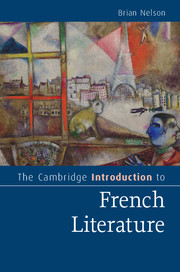Book contents
- Frontmatter
- Dedication
- Contents
- Preface
- Acknowledgements
- Chronology
- 1 Villon: a dying man
- 2 Rabelais: the uses of laughter
- 3 Montaigne: self-portrait
- 4 Corneille: heroes and kings
- 5 Racine: in the labyrinth
- 6 Molière: new forms of comedy
- 7 La Fontaine: the power of fables/fables of power
- 8 Madame de Lafayette: the birth of the modern novel
- 9 Voltaire: the case for tolerance
- 10 Rousseau: man of feeling
- 11 Diderot: the enlightened sceptic
- 12 Laclos: dangerous liaisons
- 13 Stendhal: the pursuit of happiness
- 14 Balzac: ‘All is true’
- 15 Hugo: the divine stenographer
- 16 Baudelaire: the streets of Paris
- 17 Flaubert: the narrator vanishes
- 18 Zola: the poetry of the real
- 19 Huysmans: against nature
- 20 Mallarmé: the magic of words
- 21 Rimbaud: somebody else
- 22 Proust: the self, time and art
- 23 Jarry: the art of provocation
- 24 Apollinaire: impresario of the new
- 25 Breton … Company: Surrealism
- 26 Céline: night journey
- 27 Sartre: writing in the world
- 28 Camus: a moral voice
- 29 Beckett: filling the silence
- 30 French literature into the twenty-first century
- Notes
- Further reading
- Index of authors and titles
- Index of genres, movements and concepts
- Cambridge Introductions to …
- References
29 - Beckett: filling the silence
Published online by Cambridge University Press: 05 July 2015
- Frontmatter
- Dedication
- Contents
- Preface
- Acknowledgements
- Chronology
- 1 Villon: a dying man
- 2 Rabelais: the uses of laughter
- 3 Montaigne: self-portrait
- 4 Corneille: heroes and kings
- 5 Racine: in the labyrinth
- 6 Molière: new forms of comedy
- 7 La Fontaine: the power of fables/fables of power
- 8 Madame de Lafayette: the birth of the modern novel
- 9 Voltaire: the case for tolerance
- 10 Rousseau: man of feeling
- 11 Diderot: the enlightened sceptic
- 12 Laclos: dangerous liaisons
- 13 Stendhal: the pursuit of happiness
- 14 Balzac: ‘All is true’
- 15 Hugo: the divine stenographer
- 16 Baudelaire: the streets of Paris
- 17 Flaubert: the narrator vanishes
- 18 Zola: the poetry of the real
- 19 Huysmans: against nature
- 20 Mallarmé: the magic of words
- 21 Rimbaud: somebody else
- 22 Proust: the self, time and art
- 23 Jarry: the art of provocation
- 24 Apollinaire: impresario of the new
- 25 Breton … Company: Surrealism
- 26 Céline: night journey
- 27 Sartre: writing in the world
- 28 Camus: a moral voice
- 29 Beckett: filling the silence
- 30 French literature into the twenty-first century
- Notes
- Further reading
- Index of authors and titles
- Index of genres, movements and concepts
- Cambridge Introductions to …
- References
Summary
We always find something, eh, Didi, to give us the impression that we exist?
– Estragon, Waiting for GodotThe Irish-born Samuel Beckett (1906–89), though associated with the ‘new novel’ (see below, pp. 223–24) and the ‘new theatre’ of Eugène Ionesco (1912–94), Arthur Adamov (1908–70) and Jean Genet (1910–86), wasahighly original writer who developed his own distinctive modes of expression in fiction and on the stage. His work has been described by J. M. Coetzee as ‘philosophical comedy’. ‘Beckett,’ he writes, ‘was an artist possessed by a vision of life without consolation or dignity or promise of grace, in the face of which our only duty – inexplicable and futile, but a duty nonetheless – is not to lie to ourselves. It was a vision to which he gave expression in language of a virile strength and intellectual subtlety that marks him as one of the great prose stylists of the twentieth century.’
Finding a voice
Beckett's discovery of his literary voice came to him as a kind of revelation shortly after the Second World War. It became clear to him that he should allow his work to be created out of his pessimistic view of the world and his sombre conception of what it means to be human; it would be shaped by what he called, in his highly autobiographical play Krapp's Last Tape (1958), ‘the dark [he had] always struggled to keep under’. It was now, in 1946, that he decided to write mainly in French, which he knew intimately (he had been a student at Trinity College, Dublin, excelling at French and Italian, and had settled in Paris in 1937). Eschewing the Joycean verbal flamboyance of his pre-war English works (Murphy, 1938, for example), he aimed for a more rigorous and concentrated form of writing. The now familiar adjective ‘Beckettian’ is usually used to denote ‘meaning stripped down to a minimum of discourse or ornament to reveal existence as such in its full bleakness’ (Luke Thurston).
- Type
- Chapter
- Information
- The Cambridge Introduction to French Literature , pp. 216 - 222Publisher: Cambridge University PressPrint publication year: 2015

